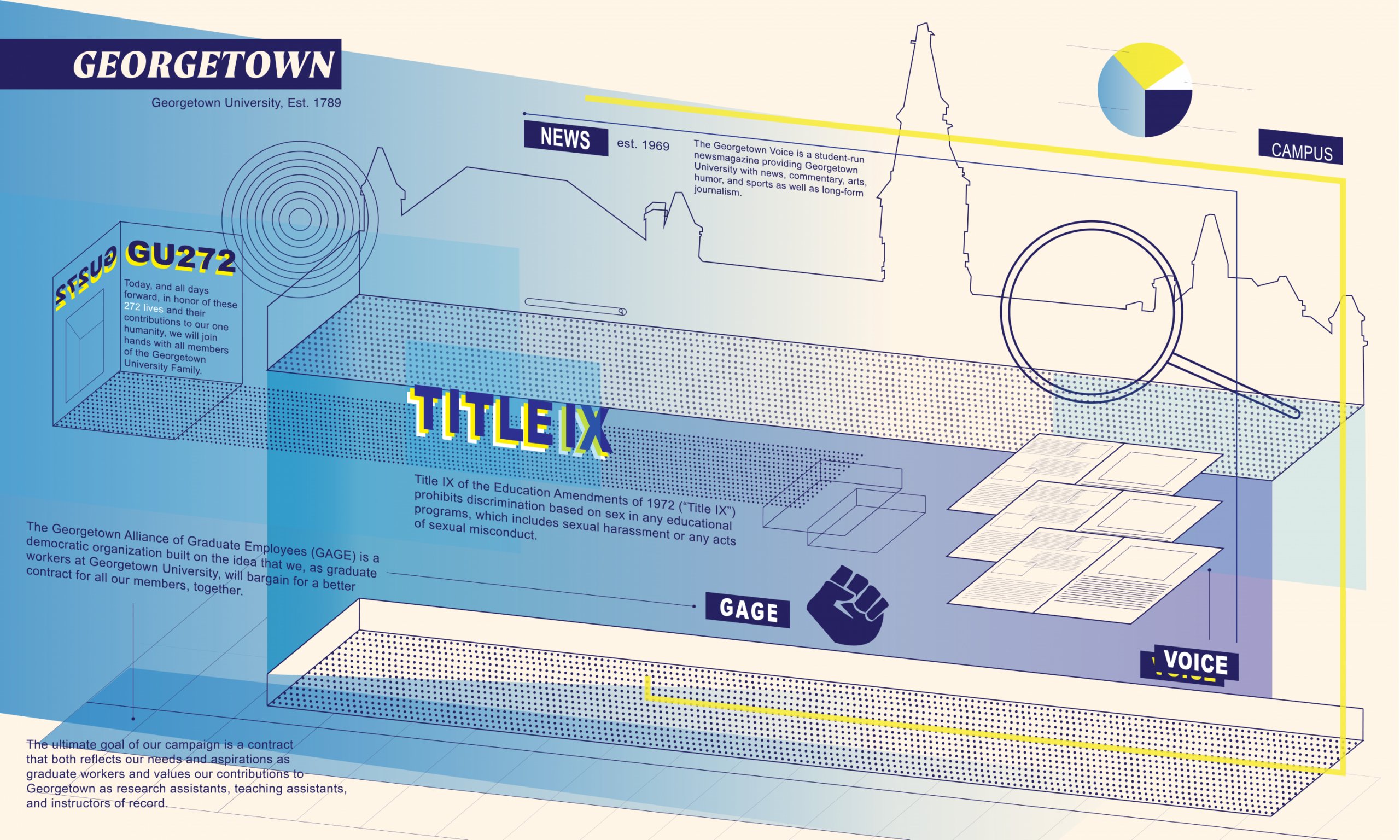Following years of debate, GUSA has passed a referendum asking students to vote on whether GUSA should restructure itself. The vote on this referendum will be held on Nov. 6, and will come in the form of a ballot question posed to the student body.
How will GUSA change?
The most significant change proposed by the referendum is the abolition of the Senate and the Executive. The Senate and Executive will be replaced by an assembly that will act as the forum for elected members. Rather than having a Senate that meets weekly, the assembly will meet as needed, and its work will be driven by policy committees instead of passing legislation. These policy committees will now report directly to the assembly. There will, however, still be a Secretary of the Assembly to handle communications and help direct the administrative support units.
Those in favor of restructuring GUSA have long argued that having two branches creates redundancy and bureaucracy. At the most recent GUSA meeting, Sen. Bora Balçay (SFS ’23) explained that only 29 percent of GUSA staff work directly with policy. By expanding the mandate of policy committees and reducing the role of the Executive, advocates for the referendum hope to increase the number of students involved in policy work.
The current Constitutional Council (CC), a mediating body that hears cases brought by GUSA members of GUSA’s bylaws and constitution, will be abolished as well, and a modified Ethics and Oversight Committee will take its place. Ethics and Oversight deals with GUSA’s attendance and conduct. The architects of the restructure referendum argue that, given that GUSA is not a formal legislative body and the interpretive power of the CC was rarely employed, its elimination will make GUSA more effective.
A few critical parts of GUSA, however, will not change, including the Election Commission, which currently oversees all GUSA elections and referendums. The Finance and Appropriation (FinApp) committee will remain unchanged and will be added to the new GUSA constitution. FinApp is responsible for allocating the student activities fee each spring and for using money from GUSA’s budget.
How did we get here?
GUSA has faced calls for abolition and reform since 2018, when a series of Senate members resigned citing complaints that the Senate created a toxic work environment. Since then, many senators and members of the Executive, including the current GUSA president and vice president, ran on the platform to restructure GUSA.
In Fall 2020, GUSA Vice President Nicole Sanchez (SFS ’22) was elected chair of the Ethics and Oversight committee, and she and Dakyung Ham (COL ’22), co-director of the Executive’s restructuring efforts, immediately got to work on GUSA restructure. Out of Ethics and Oversight, an official committee was formed to lead GUSA restructuring.
“We spent almost an entire year on research” said Sanchez in an interview with the Voice.
This committee conducted research on student unions, grad-student unions, and even workers unions. They also looked at student governments throughout the United States and internationally. Moreover, this committee even considered other national governments. They collaborated with past and present GUSA members, conducting a series of interviews with FinnApp chairs, Elections Committee members, and with other stakeholders in the university community. By the end of the 2020-2021 academic year, the official framework for restructuring was created.
“All of spring and summer was spent on finalizing the big concept we brought to the Senate. Fall came and that’s when the final details began to emerge, including what would happen to FinnApp and the Elections Commission,” Sanchez said.
At the start of this current academic year, the official drafting process for the new constitution, to be voted upon in the referendum, began and was concluded in October. The Senate then debated the wording of this referendum and passed it at their Oct. 17 meeting.
What are the main arguments for and against restructuring GUSA?
Advocates for the referendum argue that since GUSA operates more like an advocacy body than a governing body with real legislative power, its structure should be changed to reflect this role.
“The current GUSA structure does not make sense, since we don’t have any enforcement power. When we pass legislation, nothing necessarily happens, so we can’t structure GUSA like a state government,” Balçay said. “The balance of administration to policy work needs to change.”
Restructure advocates also argue that GUSA is currently an institution with significant barriers to entry for marginalized students.
“It’s going to be a lot easier for students to join GUSA, and find out what GUSA does and generally take part in it. Also, when you do join GUSA it will be so much easier for them to work with other people,” Ham said in an interview with the Voice.
Sanchez also argued that the current hierarchical structure of GUSA often makes it difficult for students to feel comfortable in the organization. “These titles are pointless, they do nothing but make people uncomfortable,” Sanchez said in an interview with the Voice.
Advocates for the restructure referendum also note that GUSA currently does most of its meaningful work through policy teams, and that expanding their mandate is critical to achieving a more functional GUSA. Sanchez provided the example of GUSA’s accessibility policy team.
“One of the best models of policy work being done is the accessibility team at GUSA,” Sanchez said. “They’ve gotten HoyaLift off the ground, they’ve gotten the school to commit to creating a disability center, they’ve gotten really great work done with the ARC and mental health projects.”
She added that while policy teams currently do important work, these teams would have an improved ability to advocate for students if the barriers and bureaucracy within GUSA were removed.
“We have the power and the strength to make stuff happen, and a lot of good stuff gets done, it just gets kinda overshadowed by the drama and the bureaucracy of the Senate and Executive,” Sanchez said.
Sanchez added that the main purpose of restructure is to create a more effective and functional GUSA.
“It’s going to make GUSA more accessible to the student body and going to allow GUSA to do more work,” said Sanchez. “Students should vote yes because you want the school to work for you, you want the school to be a place where you thrive and in order to do that you need to maximize student voice and in order to maximize student voice you need to maximize student advocacy.”
Critics of the referendum, however, raised concerns over the proposal, including the tight timeline to publicize the proposed changes before students have to vote, the lack of freshmen input, and the elimination of leadership positions.
“I don’t think that we have time to do this plan justice by putting it in front of the student body as a referendum,” Sen. Olivia Kleier (SFS ’22) said at the Oct. 17th GUSA meeting. “If we as a body don’t understand this proposal well enough, then I’m not sure that we will do a good job publicizing it in three weeks to the whole student body. ”
According to Sanchez, there is already a fully drafted plan to educate the student body on these changes, including the use of social media graphics and a town hall for students to share questions and thoughts on the referendum. The date and time for the town hall has yet to be announced. In an interview with the Voice, Sen. Dominic Gordon (SFS ’24) pointed out that GUSA has had experience with quickly informing and mobilizing the student body.
“We’ve had tight timelines for referendums before,” Gordon said, pointing to the Metro U-Pass referendum that passed in May.“Here’s the thing a lot of people don’t understand with student government: timelines are always tight.”
Additionally, the lack of freshmen involvement in the process has prompted criticism, with first-year Joe Massaua (SFS ’25), who attended the GUSA meeting on Oct. 17, sharing his thoughts when the Senate opened the floor to comment from the public.
“We don’t want to bear the brunt of your wrong decisions,” Massaua said.
What comes next?
If the referendum were to pass, there will be a transition commission formed at the start of this coming spring semester. There will be a series of briefings for existing Executive staff on their new roles, should they choose to stay on. Additionally, there will be a bylaw review session to make necessary amendments to implement the changes, Sanchez shared with the Voice. The final changes will then go into effect after the Spring Assembly elections.
In the meantime, the Senate plans to spend the following weeks publicizing the proposed changes and educating the student body about the referendum, leading up to the Nov. 6 election. The Executive is providing office hours for students to learn more about the referendum on Mondays and Wednesdays from 2 p.m. to 5 p.m., and on Thursdays from 6 p.m. to 9 p.m.





